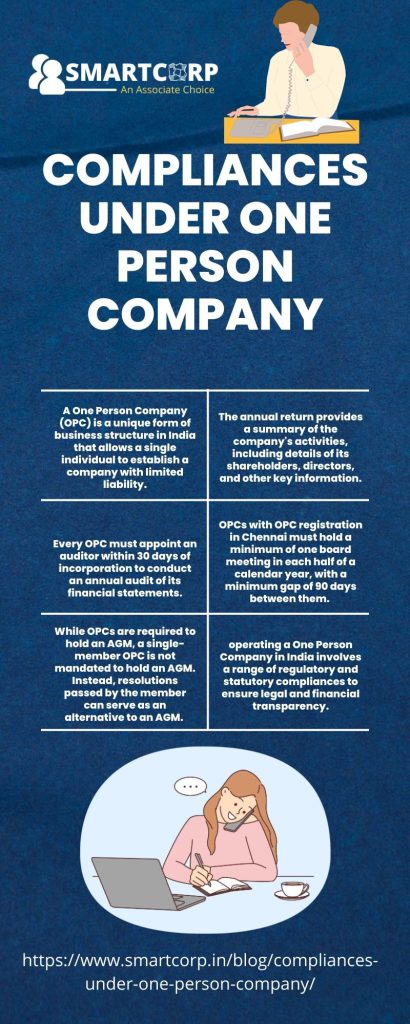
Compliances under One Person Company
A One Person Company (OPC) is a unique form of business structure in India that allows a single individual to establish a company with limited liability. While OPCs offer several advantages, they are subject to various compliances and regulatory requirements to ensure transparency, corporate governance, and legal compliance. In this blog, we will explain the key compliances that an OPC must adhere to in India.
Incorporation and Registration:
The initial step in OPC registration in Chennai. To do this, you need to follow these steps:
Obtain Digital Signatures:
The first compliance requirement is to obtain Digital Signature Certificates (DSCs) for the proposed director(s). DSCs are required for filing documents electronically with the Ministry of Corporate Affairs (MCA).
Director Identification Number (DIN):
All directors of the OPC must obtain a Director Identification Number (DIN). This can be done by submitting Form DIR-3 to the MCA along with the necessary documents.
Name Reservation:
Choose a unique name for your OPC and submit it for approval to the MCA using Form SPICe+ (Simplified Proforma for Incorporating Company Electronically).
Memorandum and Articles of Association:
Draft the Memorandum of Association (MoA) and Articles of Association (AoA) for your OPC. These documents outline the company’s objectives and rules governing its operation.
Filing for Incorporation:
Once you have the DSCs, DINs, name approval, and MoA/AoA in place, you can file the SPICe+ form with the MCA for OPC registration in Chennai. This form includes details about the director, registered office, and other essential information.
PAN and TAN Application:
After incorporation, apply for a Permanent Account Number (PAN) and Tax Deduction and Collection Account Number (TAN) for your OPC. These are essential for taxation purposes.
Appointment of a Company Secretary:
While it is not mandatory for OPCs to appoint a Company Secretary, if the company’s paid-up share capital exceeds Rs. 5 crore or if it becomes obligatory based on other regulations, then the appointment becomes necessary.
Filing of Annual Financial Statements:
OPCs which need OPC registration in Chennai are required to prepare and file annual financial statements with the Registrar of Companies (RoC). The following are the key financial statements that must be filed:
a. Balance Sheet: This provides an overview of the company’s financial position, including assets, liabilities, and equity, as of the end of the financial year.
b. Profit and Loss Statement: This details the company’s revenues, expenses, and net profit or loss for the financial year.
c. Cash Flow Statement: This presents the inflows and outflows of cash and cash equivalents during the year, categorizing them into operating, investing, and financing activities.
Annual Return Filing:
In addition to financial statements, OPCs must file an annual return with the RoC. The annual return provides a summary of the company’s activities, including details of its shareholders, directors, and other key information. The annual return is filed using Form MGT-7.

Board Meetings:
OPCs with OPC registration in Chennai must hold a minimum of one board meeting in each half of a calendar year, with a minimum gap of 90 days between them.
The objective is to discuss the company’s operations, finances, and other important matters. If the OPC has only one director, resolutions can be passed instead of convening meetings.
Auditor Appointment and Audit:
Every OPC must appoint an auditor within 30 days of incorporation to conduct an annual audit of its financial statements. The auditor must be a Chartered Accountant in practice. The audit report must be submitted to the RoC along with the financial statements.
Maintenance of Statutory Registers:
OPCs are required to maintain various statutory registers and records, including:
a. Register of Members: This contains details of the company’s shareholders, including their names, addresses, and shareholding.
b. Register of Directors: It records the particulars of the company’s directors, including their names, addresses, DINs, and date of appointment.
c. Minutes of Meetings: OPCs must maintain minutes of board meetings and general meetings, documenting the discussions and decisions made during these meetings.
d. Register of Charges: If the company has taken any loans or created charges on its assets, details of these transactions must be maintained in a register of charges.
Compliance with Income Tax Act:
OPCs with OPC registration in Chennai are subject to various tax-related compliances, including:
a. Income Tax Return (ITR): OPCs must file their income tax returns by the due date, typically on or before September 30th of the assessment year. The tax return must be accompanied by the audited financial statements.
b. Tax Deduction at Source (TDS): If an OPC makes payments that are subject to TDS, it must deduct and deposit the tax with the government as per the Income Tax Act.
c. Goods and Services Tax (GST): If the OPC’s turnover exceeds the prescribed threshold, it must register for GST and comply with the GST regulations, including filing regular GST returns.
Disclosure of Interest by Directors:
Directors of OPCs are required to disclose their interests in any contracts or arrangements made by the company. This disclosure should be made at the first board meeting in which the contract is discussed, and it must be recorded in the minutes.
Annual General Meeting (AGM):
While OPCs are required to hold an AGM, a single-member OPC is not mandated to hold an AGM. Instead, resolutions passed by the member can serve as an alternative to an AGM. However, OPCs with more than one member must hold an AGM within the prescribed timeframe.
Compliance with Other Applicable Laws:
Apart from the specific compliances mentioned above, OPCs must also adhere to various other laws and regulations that may be applicable to their specific industry or business activities. These may include environmental laws, labor laws, and sector-specific regulations.
Filing of Forms and Returns with MCA:
OPCs with OPC registration in Chennai must file various forms and returns with the MCA as required by the Companies Act, 2013. These include changes in directors, address, or share capital, as well as any special resolutions passed by the company.
Conclusion
In conclusion, operating a One Person Company in India involves a range of regulatory and statutory compliances to ensure legal and financial transparency. From incorporation to annual filings, board meetings, and tax compliance, staying compliant with these requirements is crucial for the smooth operation of the OPC. It is advisable to engage a qualified company secretary or legal professional to navigate the complexities of compliance and to ensure that the OPC operates within the bounds of Indian corporate laws.

